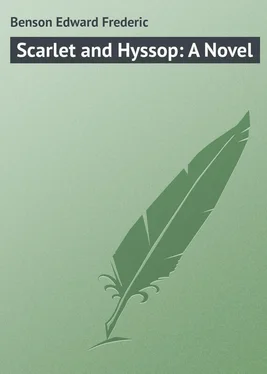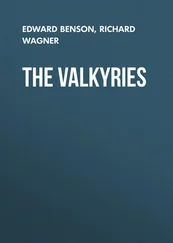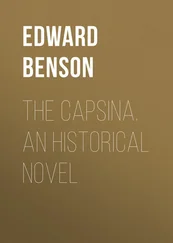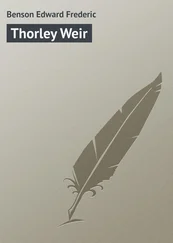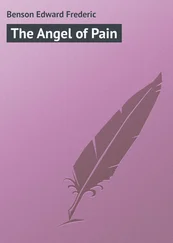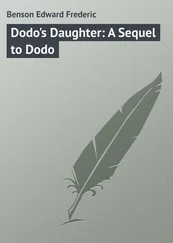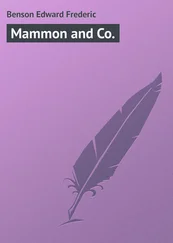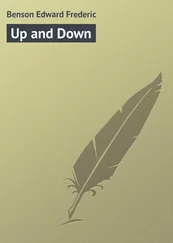Edward Benson - Scarlet and Hyssop - A Novel
Здесь есть возможность читать онлайн «Edward Benson - Scarlet and Hyssop - A Novel» — ознакомительный отрывок электронной книги совершенно бесплатно, а после прочтения отрывка купить полную версию. В некоторых случаях можно слушать аудио, скачать через торрент в формате fb2 и присутствует краткое содержание. Жанр: foreign_prose, на английском языке. Описание произведения, (предисловие) а так же отзывы посетителей доступны на портале библиотеки ЛибКат.
- Название:Scarlet and Hyssop: A Novel
- Автор:
- Жанр:
- Год:неизвестен
- ISBN:нет данных
- Рейтинг книги:5 / 5. Голосов: 1
-
Избранное:Добавить в избранное
- Отзывы:
-
Ваша оценка:
- 100
- 1
- 2
- 3
- 4
- 5
Scarlet and Hyssop: A Novel: краткое содержание, описание и аннотация
Предлагаем к чтению аннотацию, описание, краткое содержание или предисловие (зависит от того, что написал сам автор книги «Scarlet and Hyssop: A Novel»). Если вы не нашли необходимую информацию о книге — напишите в комментариях, мы постараемся отыскать её.
Scarlet and Hyssop: A Novel — читать онлайн ознакомительный отрывок
Ниже представлен текст книги, разбитый по страницам. Система сохранения места последней прочитанной страницы, позволяет с удобством читать онлайн бесплатно книгу «Scarlet and Hyssop: A Novel», без необходимости каждый раз заново искать на чём Вы остановились. Поставьте закладку, и сможете в любой момент перейти на страницу, на которой закончили чтение.
Интервал:
Закладка:
So he who should perhaps control so huge an affair as the army, and she who controlled him, rode back towards Hyde Park Corner, a striking-looking pair, at which many gazed. Their friendship was now of several years' standing, and people had begun to find that there was nothing new to say about so well-established a fact. There had never been any scandal, and London is a wonderfully tolerant town. It is, in fact, almost incapable of being shocked except by that which is printed in the daily papers. This constitutes the real power of the press. As long as definite publicity in black type on white or pink paper is not given, a fact, however well known, remains private; it is only truly shocking when the compositor has set it up; then takes place a great and essential change. And this morning half the world looked at them, and remarked on the beauty of their horses and the fine horsemanship of their riders, and shrugged their shoulders now and then, and smiled and talked about something else.
"So you had better lunch with me, Jack," said Mrs. Brereton, going back to her subject. "You have a Committee at three, I know."
"And what must I say to Marie?" asked he.
"Say? Say you lunched with me. It has also the minor advantage of being perfectly true. Oh, so few people see the extraordinary advantage to be gained by telling the truth. It is so easy, too: you can tell the truth by a mere effort of memory, whereas any – any diplomatic evasion calls the imaginative faculty into play."
"I don't think I've got the imaginative faculty," said Jack.
"No, you haven't much. That is why, when you evade, you are always so unconvincing. Rich ornamental detail is necessary to the simplest untruth, whereas if you are telling the truth the cruder you are the better. Your very crudity, Jack, is the making of you as a politician."
"I know what I want politically, anyhow," he said. "I want proper rifles and the knowledge among the men as to the right direction in which to fire them off."
"Oh, don't make speeches. That is exactly your oratorical style – in other words, no style at all. The British public likes that. It says there is no nonsense about you. How odd it is that politically you should be a man of such astounding simplicity, and socially – well, a person who savours of duplicity!"
"I'm straightforward enough," said he.
"Oh – oh! Never mind that. But the British public is odder still. It insists – at least, it wishes to believe – that its public men should be people of blameless private life. Now, what can that matter? But I don't think it has any doubt about you, Jack. It believes you to be a model of domesticity. Also by my advice, you see, you breed pigs and shorthorns. There is something magical about pigs and shorthorns. The public consider them a sort of testimonial to a man's character; I suppose it is the touch of Nature, or the touch of the farmyard."
"Making the whole world kind!"
"Chestnuts, surely. Well, au revoir ; go home and dress, and try not to look glum, and tell Marie you are lunching with me. Good-bye, I must hurry: I have some things to do before lunch."
CHAPTER IV
Mrs. Maxwell was a voluminous woman of gorgeous exterior, who would have been pained to hear herself alluded to as a woman instead of a lady. There was, as she had more than once acutely remarked, a breeding that is altogether independent either of beauty or wit, and Cleopatra herself might have been utterly without it.
"And that," said Mrs. Maxwell, "is what makes the difference between a lady and not a lady."
The inference which she herself drew and meant to be drawn is too obvious to need pointing out, especially when we remember that she certainly had neither beauty nor wit, except in so far as it may be held a proof of ability to have married a money-lender of Jewish extraction and enormous wealth. But Mrs. Maxwell had ambition, and an amazing industry. Years ago when she married her Henry she had made up her mind that, if there was any power whatever in the fact of millions, she would procure whatever was to be procured with them, and in especial she had set her heart on bringing not to her feet, but to her table and her ballroom, all that was noblest and highest in the land. The task had been far less arduous than she had anticipated, and she felt on this night of the 16th of May that the prize had been publicly presented to her. Every one who was any one was going to cross her threshold that night; a favoured three or four dozen were going to dine there first, and the rest would come in afterwards. Earls and Countesses were among them. There was not room for all such nowadays at Mrs. Maxwell's table.
The form that the entertainment was going to take was a concert, for, as Mrs. Maxwell said, you can dance anywhere for the cost of your shoe-leather and a couple of trumpets; but it meant a prettier penny than most people can find in their purse to hear Pagani and Guardina sitting in a comfortable chair instead of that dreadful draughty opera-house, and having to go to that cold, creepy "foyure" to get a glass of lemonade. There was no nonsense or affectation, it will be remarked, about Mrs. Maxwell's French, which she used ruthlessly in her conversation, and all her epithets ran in well-matched pairs, like her horses.
The Maxwells' house stood in Piccadilly overlooking the Green Park, and it had been purchased as it stood, glass, plate, china, and books complete, from its owner, who was in straitened circumstances. There were not many books in the bargain, but among them, luckily enough, was the callers' book of the late owner, and for the sake of continuity and general interest Mrs. Maxwell's visitors went on writing their names there without a break, since the book at the time of their taking possession was only about half full. It was curious to observe how at first there was a sort of slump in distinguished names, which now had completely rallied and developed into a boom; in fact, on the last few pages half the names were the same as those on the earlier part of the book.
Among the many other desirable objects in the house were the pictures. These included several very fine Italian pictures by great masters, "Raffle," as Mrs. Maxwell rather familiarly called that eminent artist, being notably represented. They had occasioned a somewhat violent difference between their present master and mistress, Mrs. Maxwell maintaining that it was impossible to feel easy and comfortable beneath such serious-like pictures, Transfigurations and what not, and observing with some heat that you couldn't sit quiet in your chair with St. Stephen stoned and bleeding immediately above your head. Eventually a compromise had been arrived at, and they had been removed from the drawing-room into the corridor. But even more pointed had been the discrepancies arising from the small but exquisite half-dozen of Dutch pictures that had hung in the dining-room. Mr. Maxwell, again, had been disposed to leave everything exactly as they had found it, arguing that a family who had lived in the house for a couple of hundred years knew more about what was suitable to the house than they. This had inflamed his wife.
"It's a matter of taste, Maxwell," she said; "and I've got as much right to my own taste as any Duke in the kingdom. And I maintain that while you're eating your dinner there's no pleasure in looking at a row of pots and pans hung on the wall, as if to remind you of where your food has been, and cheeses and what not. And as for that picture of old Dutchmen eating I don't know what horror, and smoking their pipes the while, why, it's enough to turn the good wholesome food in your stomach. And that's my opinion, whether you like it or not."
Mr. Maxwell, who was a just man except in matters of money-lending, realized that he did not feel as keenly as this.
Читать дальшеИнтервал:
Закладка:
Похожие книги на «Scarlet and Hyssop: A Novel»
Представляем Вашему вниманию похожие книги на «Scarlet and Hyssop: A Novel» списком для выбора. Мы отобрали схожую по названию и смыслу литературу в надежде предоставить читателям больше вариантов отыскать новые, интересные, ещё непрочитанные произведения.
Обсуждение, отзывы о книге «Scarlet and Hyssop: A Novel» и просто собственные мнения читателей. Оставьте ваши комментарии, напишите, что Вы думаете о произведении, его смысле или главных героях. Укажите что конкретно понравилось, а что нет, и почему Вы так считаете.
